Croatia’s Border Disputes with Neighbours in Light of Schengen Entry
December 14, 2022 - As the day of the Croatian entry into Schengen area approaches, we take another look at the border disputes Croatia has with its neighbours.
(This is an updated article from the original back in 2016)
The total length of the land borders of Croatia is 2,370 km, and all of those borders will experience a change on January 1st, when Croatia joins Schengen: the borders to Slovenia (659 km) and Hungary (355 km) have been the outside borders of the Schengen area until now, and will become much less important now as Croatia joins the Agreement and all border controls within the Area are abolished. The borders to Croatia's other neighbors, the longest one to Bosnia and Herzegovina (1011 km) as well as to Serbia (326 km) and Montenegro (20 km) are set to become the outside borders of the Schengen area.
Among many problems which burden relations between republics of former Yugoslavia, one of the main issues are numerous border disputes which are a consequence of the fact that Yugoslavia, while having strictly defined borders with other countries, did not have precisely marked or defined borders among its constituent parts. That fact explains why Croatian relationship with Hungary is not burdened by yet another problem, unless you count the current Hungarian Prime Minister recently claiming most of the Croatian territory.
While the disputed areas between the former republics are usually relatively small, they represent a major headache for governments of now independent states, since they are under pressure from the media and voters not to compromise and “give away” an inch of supposedly their territory.
Slovenia
Border disputes with Slovenia and Croatia are certainly the most well-known of all. Not only do they burden the bilateral relations, but they even delayed the entry of Croatia in the European Union. The most important part of the dispute concerns the border at sea. At issue is whether the border should follow the middle line between Croatian and Slovenian coast (which would mean that Slovenian sea would border just Italy and Croatia), or should be drawn in a way which would allow Slovenia to reach international waters. The dispute has been unsolved since early 1990s, with occasional incidents at sea between police and fishermen’s boats. There were repeated attempts by the two governments to come to an agreement, but they would inevitably be impeded by pressure from the media and public against any compromise.
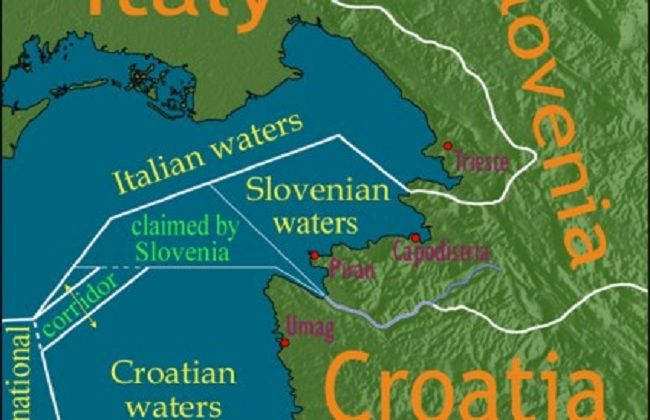
Slovenia knew that the best time for an agreement to be reached was during Croatia’s accession negotiations with the European Union. Since Slovenia had entered the EU earlier, it was able to blackmail Croatia and that is exactly what it did in 2008 when it blocked the negotiations. The move caused a complete breakdown in relations, with Croatia accusing Slovenia of hostile behaviour. After Ivo Sanader, Croatian Prime Minister at the time resigned in July 2009, new Prime Minister Jadranka Kosor prioritised the unblocking of negotiations. Later that year, Kosor reached an agreement with Slovenian government that negotiations would continue and that the border dispute would be decided by arbitration proceedings. In return, Slovenia unblocked the negotiations and Croatia became a member of the European Union in 2013.
After that, there was an entire international scandal during the arbitration process, in which the media published evidence of collusion between a supposedly independent arbiter and Slovenian Foreign Ministry, which led to Croatia dropping out of the arbitration process completely. The arbitration concluded in 2017 with a win for Slovenia, and Croatia still not acknowledging that decision as binding.
And that's more or less where we stand today still. Once the decision of Croatia's entry into Schengen was announced, both Croatia and Slovenia issued their reaction to their border dispute, and it seems the disputes are here to stay. Both Croatia and Slovenia issued one-sided statements upon the confirmation of the decision, both standing firmly at their previous stances.
There are several disputed sections of the land border as well, with the one in Istria being very important since the endpoint of the land border will influence the sea border as well. River Dragonja in Istria used to be a border, but when an artificial channel was made about 500 metres in Croatian territory in order to control flooding decades ago, Slovenia decided that this was now Dragonja and that the border should be there.
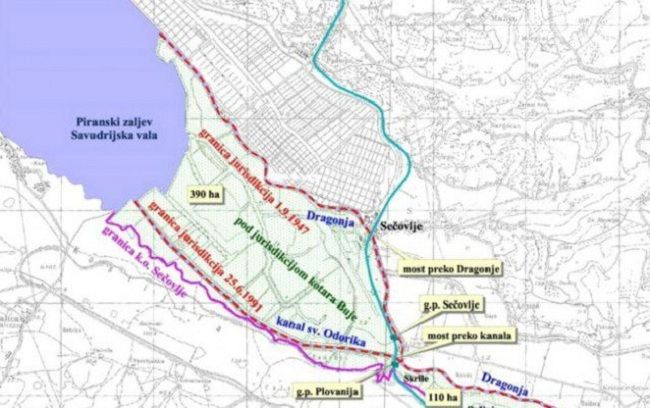
Another point of contention is Sveta Gera peak in Žumberak hills. Actually, even Slovenia more or less accepts that the peak itself and a military installation which is located there belong to Croatia, but that has not prevent its army from “occupying” the facility for the last 25 years. This was the first major border dispute between the two countries, but in recent years it has been somewhat overshadowed by the sea border issue. There are also several other sections of the land border that both countries claim for themselves.
Bosnia and Herzegovina
Compared to Slovenia, the border disputes with Bosnia and Herzegovina seem insignificant, but listening to some politicians in the past, you could get the impression that it was the most important thing in the world.
The entire disputed area is around Neum, Pelješac Peninsula and, obviously, the Pelješac Bridge, whose exact location was one of the reasons so many unimportant problems kept being brought up. The first is the small Klek peninsula, rather, its very tip, which Croatia has claimed as theirs for a while, together with two small islands next to it, Veliki Školj and Mali Školj. Both islands are uninhabited and too small to serve any useful purpose, but Croatia insisted that it should have control over them. While Croatia has hundreds of similar islands in its part of the Adriatic Sea, Bosnia and Herzegovina has a very short coast around Neum, and these two islands would virtually be the only ones it would have, so they have great symbolic importance for it as a supposedly “maritime” country. Another disputed area is a part of the border near Hrvatska and Bosanska Kostajnica, where at issue is a small castle currently controlled by Croatia, with both countries claiming it as theirs.
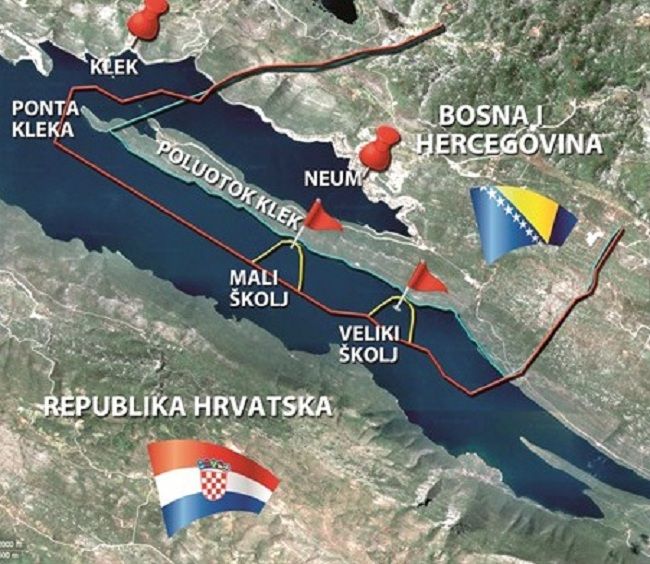
In the late 1990s, then presidents of the two countries, Franjo Tuđman and Alija Izetbegović, signed an agreement on the border demarcation, which provided for the disputed area at Neum to be given to Bosnia. However, the Croatian Parliament never ratified the agreement, claiming that a mistake was made by experts who were working on maps which are part of the agreement. Interestingly, then Croatian President Tuđman was never accused by “patriots” of being a traitor for signing such an agreement, as opposed to Prime Minister Račan, who in early 2000s tried to solve border problems with Slovenia by almost coming to an agreement with Slovenian Prime Minister Janez Drnovšek and who is still being blamed for all the border problems with Slovenia (any many other things). Luckily, these days, with the project of Pelješac Bridge finished in spite of the opposition by (some) Bosnian politicians, nobody is really talking about the tip of Klek or the small islands any more.
Montenegro
Montenegro is the smallest of all of Croatia’s neighbouring countries and its part of the border is the shortest one, so it is understandable that there is just one disputed area. It again concerns sea border, at the Prevlaka peninsula, which is with its Oštra Cape the southernmost tip of Croatia. In 2002, Croatia and Montenegro signed an agreement on temporary border regime. There have been no major incidents since, but it has still not been defined whether the temporary line will be turned into a permanent one. There were some disputes between the two countries when both of them announced tenders for oil and gas exploration in the area, with both countries claiming that the other one had no right to publish such tenders, but tensions soon calmed down.
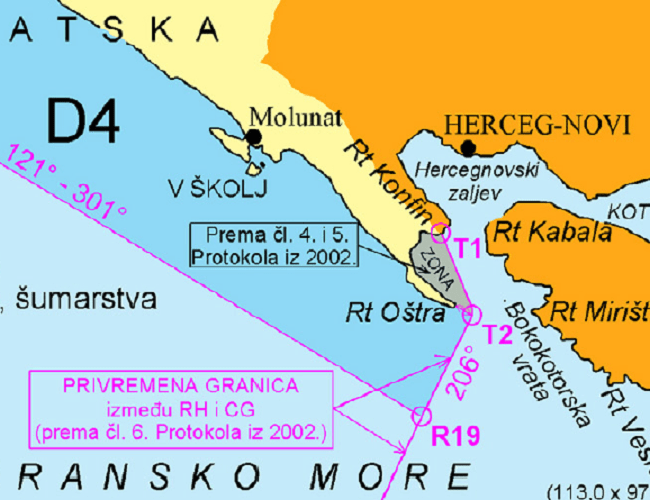
Serbia
Every list of Croatia’s problems has to include Serbia, and this one is no exception. If you think that the fact that the border between them is in a large part defined by the Danube, one of major European rivers, would make it easy to know where the border is, you would be wrong. The Danube has an unfortunate habit of changing its course, which leaves an open question of whether the border moves with it or not. Croatia claims that the border should follow an old course of the river, while Serbia wants the border to follow the middle of the current course.
According to Croatian proposal, both countries would have significant parts of territory on the “wrong” side of the river. While a perhaps logical solution would be for the two countries to exchange these pieces of land, the problem is that Croatia has about 10,000 hectares of land on the Serbian side of the Danube, while Serbia has just 1,000 hectares on the Croatian side.
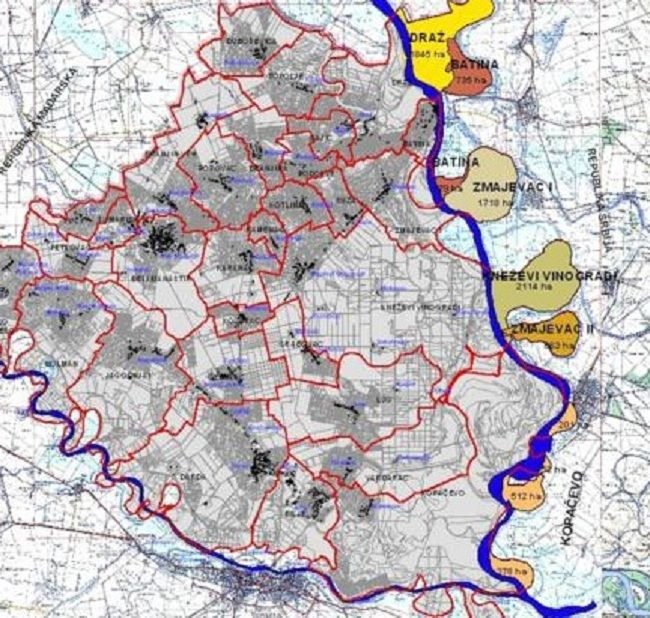
Any compromise about borders is difficult, but when it comes to the border with Serbia, it is absolutely impossible that any Croatian politician would survive giving an inch of territory. Since the border area was occupied during the Homeland War and was only returned to Croatian jurisdiction after seven years, in 1998, the pressure from the public and the media would be impossible to resist. And, while “our people have bled for this land” argument is being used against compromise for all the disputed territories, in the Danube area that is literally true, making any compromise virtually unattainable.
The border on the Danube does not involve just the territory on the other side of the river, but also the issue of small pieces of land in the middle. And that leads us to Croatia’s final border “dispute”.
Liberland (?)
While border disputes usually involve two or more countries claiming that the same piece of land or sea belongs to them, due to peculiarities of the border dispute on the Danube, there are several areas which Croatia claims belong to Serbia, and Serbia claims belong to Croatia. One such area is Gornja Siga, a 7-square kilometre large uninhabited area on the Croatian side of the river. In 2015, Czech libertarian politician and activist Vit Jedlička proclaimed “the Free Republic of Liberland” there, saying that, since both countries claim that they do not want the territory, it was “terra nullius” and could be claimed for a new state.
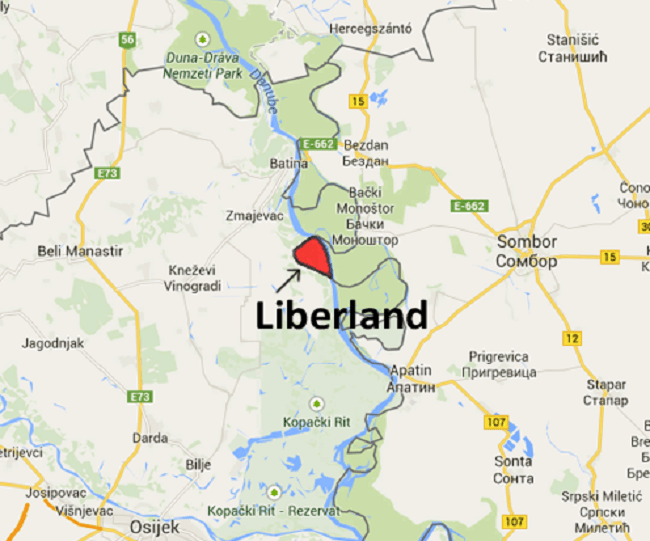
Reactions from Croatia and Serbia were different. Serbia announced that, although it considered the whole affair to be a trivial matter, the “new state” did not impinge upon the Serbian border, which it believes should be on the Danube river. Croatia, which currently administers the land in question, has stated that, after the resolution of the border dispute, the territory will be awarded to either Croatia or Serbia and therefore cannot be considered as “terra nullius”.
People coming to the island, including “President” Jedlička, have been occasionally arrested by Croatian police, which appears confused whether people should be arrested when coming from Croatian or from Serbian side of the river. Croatian courts first ruled that it was forbidden to cross from Serbia to Liberland, but then realized that they were actually confirming that the area was not part of Serbia, which was precisely what Serbia wanted. In later verdicts, courts ruled that it was forbidden to enter Liberland from Croatia. In recent years, it seems that everyone's interest in the stunt has subsided, probably around the time when the Liberland government announced that they would be issuing their own cryptocurrency. In light of the newest developments, with Croatia getting rid of any border controls with Hungary, it would be interesting to see what would happen if "President" Jedlička or some of his supporters decided to take a river boat from anywhere within Schengen and come to the island following the Danube, thus not entering from Croatia nor from Serbia.
PM Says Croatia Will Not Erect Fence on Border With BiH After Schengen Area Entry
ZAGREB, 18 Dec, 2021 - Once it enters the Schengen area of passport-free travel, Croatia will not erect a fence on the border with Bosnia and Herzegovina, Prime Minister Andrej Plenković said in an interview with the Večernji List daily Saturday issue.
Commenting on his visit to Bosnia and Herzegovina earlier this week, Plenković said that Croatia supports BiH's sovereignty and integrity as well as its spirit as agreed in Dayton - one state, two entities and three equal constituent peoples, noting that Croatia will not allow the inequality of Croats in relation to the other two constituent peoples.
"My position is clear and I reiterated it once again in Sarajevo and Mostar - Croatia will not erect a fence or a wall on the border with Bosnia and Herzegovina. That border connects us and that will remain so after Croatia's accession to the Schengen area. But that makes cooperation between our police forces and other relevant services extremely important, so that we can prevent illegal migrations," he said.
Schengen entry is not only a major privilege, it is also a major obligation for Croatia. Our state border with BiH, Serbia and Montenegro will become the external Schengen border and that is why effective, responsible and thorough control of the border will be a permanent task of the Croatian border police, Plenković said.
He added that agreement was reached during his visit to Sarajevo on the continuation of talks on a possible change of the categories of individual border crossings and on facilitating the flow of people and goods in line with EU regulations.
For more on politics, follow TCN's dedicated page.
For more about Croatia, CLICK HERE.
HAK Confirms Temporary Closure of 20 Croatia-Bosnia Border Crossings
ZAGREB, April 2, 2020 - Following an agreement between Croatia and Bosnia and Herzegovina, 20 border crossings between these two countries were closed temporarily at 7 am Thursday, the Croatian Automobile Club (HAK) said on Thursday morning.
In order to stem the spread of the coronavirus pandemic, Croatia and Bosnia and Herzegovina have agreed to temporarily close 20 of their mutual border crossings as of 7am Thursday, the Croatian Police Directorate announced on Wednesday.
The traffic is thus suspended at the following border crossings: Svilaj, Gejkovac, Pašin Potok, Bogovolja, Kordunski Ljeskovac, Lička Kaldrma, Bili Brig, Aržano Pazar, Dvorine, Cera, Jovica Most, Sebišina, Slivno, Podprolog, Unka, Vukov Klanac, Imotica, Slano, Hrvatska Dubica and Gabela Polje.
More news about relations between Croatia and Bosnia and Herzegovina can be found in the Politics section.
Bosnia Starts Constructing New Svilaj Border Crossing to Croatia
ZAGREB, April 1, 2020 - Bosnia and Herzegovina started constructing a new border crossing to Croatia, located by the bridge over the Sava River in the village of Svilaj, near Slavonski Brod, it was announced on Tuesday by the Indirect Taxation Authority (UNO) of Bosnia.
The UNO and three Bosnian companies signed a €9.5 million contract on building the border crossing, which should be completed within 300 days.
The three companies that won the tender are "Niskogradnja" from Laktaši "Alfa term" from Mostar, and "Tehton" from Banja Luka.
Four lanes will be built at the entrance to the border crossing Svilaj, and three at the exit, which will facilitate the separation of passenger transport from freight transport.
The new border crossing is a prerequisite for opening the new bridge over the Sava River located in Svilaj, which would take some traffic away from Slavonski Brod, one of the busiest border crossings to Bosnia at the moment.
The Svilaj bridge is one of the key structures on the route of the future motorway in the Vc corridor, which will connect the Hungarian capital of Budapest and the Croatian southern seaport of Ploče. The Croatian section of the motorway from Hungary to Bosnia stretches over 59 kilometres, going via Beli Manastir, Osijek, and Đakovo.
At the Bosnian side of the border, a ten-kilometre stretch of the motorway from the bridge to the town of Odžak was built earlier, but it will only have a purpose after the remaining seventy kilometres of motorway to Zenica are built.
No deadlines have been yet given for finishing this infrastructural project Bosnia.
More news about relations between Croatia and Bosnia and Herzegovina can be found in the Politics section.
Croatia and Bosnia Improve Cooperation in Migration Control
ZAGREB, March 9, 2020 - Croatian and Bosnian police cooperate well in controlling illegal migration, and the two countries should also address their outstanding issues through dialogue, Croatia's Ambassador to Bosnia and Herzegovina, Ivan Sabolić, said in an interview with the Sarajevo newspaper Dnevni Avaz of Monday.
Sabolić said that a recent meeting between Croatian Interior Minister Davor Božinović and his Bosnian counterpart Fahrudin Radončić was an example of good cooperation that had already produced results and improved communication, especially in fighting illegal migration. He noted that the recent Croatian government decision to donate police equipment to Bosnia and Herzegovina to help it improve border control and curb cross-border crime had also contributed to that.
Asked if Bosnia and Herzegovina could benefit from the Croatian presidency of the EU, Sabolić said that Croatia strongly supported Bosnia and Herzegovina's EU path based on meeting the set criteria, and noted that no other EU member state had helped Bosnia and Herzegovina with the membership application as Croatia.
"Croatia is the staunchest advocate and friend of Bosnia and Herzegovina's EU path, which will help incorporate European values into its legal system while at the same time respecting its particularities. The Croatian presidency unquestionably supports Bosnia and Herzegovina's progress towards membership candidate status," the ambassador said.
He said that the EU-Western Balkans summit in Zagreb in May would be a chance to reinvigorate the accession processes of neighbouring countries and give fresh impetus to the dynamic of their getting closer to the EU in the years ahead.
Sabolić said that outstanding issues such as one concerning the possible construction of a radioactive waste storage facility on Mount Trgovska Gora near the Croatian-Bosnian border should be addressed through dialogue but that there had been no such initiative from Bosnia and Herzegovina so far.
"If and when the institutions of Bosnia and Herzegovina formally express the wish or need to discuss this matter, the Croatian minister in charge is ready for dialogue to address all aspects of the interest or doubts on Bosnia and Herzegovina's part," the Croatian ambassador said.
Sabolić said that the unresolved issues between the two countries were not insurmountable and could be resolved through dialogue.
He expressed serious concern about the equality of Bosnia and Herzegovina's three constituent ethnic groups, saying that it was undermined in practice to the detriment of the Croats and warned that it was necessary to prevent the possibility of one ethnic group electing representatives of another.
"Croatia supports a democratic agreement on a fair electoral law that will guarantee the adoption of European standards, prevent abuse and ensure equal status for the three constituent peoples and all citizens of Bosnia and Herzegovina," Sabolić said, adding that amending the electoral law would be a key step towards stability and progress, strengthening mutual trust and respect for the rights and freedoms of all citizens of Bosnia and Herzegovina.
More news about relations between Croatia and Bosnia and Herzegovina can be found in the Politics section.
Bihać Fears Escalation of Migrant Crisis on Croatian Border
ZAGREB, February 17, 2020 - The situation in Bosnia and Herzegovina is critical due to the problem of illegal migrant crisis and it will certainly be even worse as there is still no coordination in taking the necessary measures nor any indication that the new Council of Ministers might take more resolute action, an Una-Sava Canton official says.
"There is no coordination whatsoever between the state and lower level government. Although the Council of Ministers was formed two months ago, there is still no serious response regarding the protection of Una-Sana Canton when it comes to illegal migration," the canton's interior minister, Nermin Kljajić, was quoted as saying in Monday's Nezavisne Novine daily.
Una-Sana Canton is the hardest hit by the migrant crisis. Bihać city authorities estimate that there are about 5,000 illegal migrants in that region. Precise data indicates that 3,500 are accommodated in reception centres, while the rest are left to their own devices, staying in private accommodation if they can afford it, while others sleep in abandoned and dilapidated buildings in urban areas.
Kljajić says all reception centres have been full for a long time and that the situation is critical as BiH has no consolidated migration management plan.
Local police are having a hard time dealing with the challenges as the number of criminal offences is rising and there is no money to hire more officers.
A mild winter has already encouraged illegal migrants to attempt to continue towards BiH's western border, with more and more arriving in Una-Sana Canton every day. According to local police, at least 80 arrive every day and there is no room to accommodate them.
The canton's prime minister, Mustafa Ružnić, has said Bihać fears a likely escalation of the problem. "The worst is yet to come."
According to Ružnić, the cantonal government has asked that the Bira reception centre in Bihać and Miral in Velika Kladuša be dismantled and that a larger transit centre, where all illegal migrants would be accommodated, be set up outside residential areas. A location has been proposed but the state authorities have not taken the time to consider the initiative.
More news about migrant crisis can be found in the Politics section.
Plenković: Croatia Will Never Put up Barbed Wire Towards Bosnia
ZAGREB, January 9, 2020 - Croatian Prime Minister Andrej Plenković said on Wednesday his government would never put up barbed wire on the border with Bosnia and Herzegovina to stop illegal migrants because there were natural obstacles and that would be a bad political message to the neighbouring country.
He was speaking of migration at a meeting with foreign correspondents who arrived in Zagreb from Brussels on the occasion of Croatia's presidency of the European Union.
Some of our neighbouring EU member states have put up physical barricades and barbed wire. We haven't opted for that because we have natural barriers such as the Danube and the Sava rivers, mountains and forests, Plenković told a Dutch journalist when asked about the migrant policy Croatia would advocate during the presidency.
He said BiH was a neighbouring and friendly country with which Croatia shared many links and that barbed wire would not be a good political message for bilateral relations.
Addressing some 60 foreign journalists, Plenković said Croatians lived in many places on the other side of the border and that as prime minister he would never opt for building a barrier between Croatians.
He said it was necessary to stop illegal migration and reform the Dublin Regulation, adding that migration was the issue which, after the fall of the Berlin Wall, had changed the political mood in Europe the most.
A New York Times journalist asked if a country accused of beating and shooting at migrants, stealing from them and returning them from Zagreb to BiH could propose a reform of the migration policy.
Plenković said those were allegations, not facts, and that Croatia had opted for investing in police capabilities instead of barbed wire.
We are considering every humanitarian aspect. We have no proof of what you are saying, except two shooting incidents which occurred by accident inside Croatian territory. But that was accidental and it is not the official policy or the intention of the police, he said, adding that every complaint about the work of security forces was properly checked.
Responding to a question from a journalist of the UK's Telegraph, Plenković said Brexit was not a smart idea. Time has shown how complicated are the consequences of that decision by the then British Prime Minister David Cameron, he added.
A Wall Street Journal reporter asked if EU-US trade disputes would spill over onto the transatlantic alliance, to which Plenković replied that he believed there was common sense on both sides of the ocean, enough to avoid an escalation of those disputes.
He said the UK's exit from the EU was the right time for the Conference on the Future of Europe, with which Democracy and Demography Commissioner Dubravka Šuica of Croatia would be tasked.
A nuclear power and permanent member of the Security Council is leaving, and this is the moment for the EU to see what it must do to gain bigger support among its citizens, Plenković said.
As for countries which want to join the EU, he said that Croatia, as a country in this part of Europe, felt a responsibility for their European journey.
After talks with French President Emmanuel Macron on Tuesday, Plenković believes that France could change its opinion by the Zagreb summit on enlargement in May. Last October, France was the most vocal opponent to opening accession negotiations with North Macedonia and Albania.
He said Enlargement Commissioner Oliver Varhelyi was working on a document which could amend the accession negotiations methodology, which could satisfy France.
European Council President Charles Michel and the entire European Commission with Ursula von der Leyen at the helm is coming to Zagreb on Thursday.
More news about the migrant crisis can be found in the Politics section.
Border Police Head: Police More Effective in Detecting Crimes
ZAGREB, August 26, 2019 - The Head of Croatia's Border Police Directorate, Zoran Ničeno, has said that the police registered an almost 200% rise in the number of illegal border crossings in the first seven months of 2019, with statistics showing some 9,500 such cases.
In parallel, since a flow of migrants' started passing through Bosnia and Herzegovina, there has been an increase in the rate of detected criminal offences in this segment, Ničeno told the national broadcaster HTV on Sunday evening explaining that a rise in the detected criminal offences was also a result of the better organisation of the police work, flexibility and engagement of all police sectors in efforts to curb the inflow of irregular migrants.
For instance, the police arrested 505 migrants' smugglers in the first seven months of 2019.
Ničeno finds it disputable that Bosnia and Herzegovina's authorities have set up an accommodation centre for passing illegal migrants intentionally at the village of Vučjak, just a few kilometres from its border with Croatia.
He underscores that Croatia's law enforcement authorities have already seen media footage showing Bosnia's police officers pushing 200-300 migrants in front of themselves towards the border with Croatia in that area of Vučjak.
He criticised the attempts of the Bosnian police to make irregular migrants cross into Croatia.
The Croatian official once again dismissed accusations that Croatia's border police are pushing back migrants to Bosnia and Herzegovina.
Media outlets disseminate information that illegal crossings of the border is something normal and that migrants are always right. The attention is paid only to the humanitarian aspect of this problem that is really worrisome, he added.
He explained that the police only deter the attempts of illegal crossings into Croatia's territory.
Ničeno appealed on international and local NGOs to inform migrants that illegal entries are not permitted.
He also informed the TV audience that an investigation is under way regarding the case of a van with German licence plates that was transporting illegal migrants which swerved in the River Kupa in the village of Slatina Pokupka near the town of Glina on Sunday morning while it was trying to evade a police patrol.
A woman lost her life in that accident.
While evading a police checkpoint, the driver jumped out of the vehicle and fled towards a mine-suspected area and the vehicle fell into the river. The police smashed the windows of the van while it was afloat and rescued 11 people.
However, one of those rescued migrants, a female migrant, who was receiving medical aid, died at the scene.
The police are searching for the fleeing driver.
More news about migrant crisis can be found in the Politics section.
Frontex to Arrive on Croatia-Bosnia Border?
ZAGREB, July 19, 2019 - Slovenian Interior Minister Boštjan Poklukar has mentioned the possibility of sending Frontex (European Border and Coast Guard Agency) to the Croatian-Bosnian border to prevent illegal migration, his ministry said on Thursday.
Poklukar met with Italian Interior Minister Matteo Salvini on the fringes of a meeting of EU interior ministers and they discussed migrations and the situation in the Western Balkans, the Slovenian Interior Ministry said.
The two ministers agreed that the problem is not the Slovenian-Italian border but the external EU border which should be protected even better, the ministry said. They expressed willingness to help Croatia if it assesses that it needs help, and Poklukar mentioned the possibility of sending Frontex to the Croatian-Bosnian border, it added.
Poklukar told Salvini that closing the Slovenian-Italian border because of illegal migration was unnecessary and that the situation on the border did not call for it. Any restriction of the border regime on the border would interfere with the everyday life of people living along the border, the ministry said, adding that border closures in history had negative consequences.
More news about migrant crisis can be found in the Politics section.
Migrant Crisis Escalating on Croatian Border with Bosnia
ZAGREB, May 13, 2019 - The authorities in Bosnia and Herzegovina have to urgently deal with the extent of the migrant crisis and undertake measures to control it because the situation in Una-Sana Canton, where the most migrants are located, has become unbearable, the canton's prime minister, Mustafa Ružnić, warned on Monday. The canton is located on the border with Croatia.
Participating at a meeting of the House of Representatives of the Federation entity, Ružnić said that there are about 5,000 illegal migrants currently located in that canton, yet there is accommodation for only about 3,200 in reception centres in Bihać, Velika Kladuša and Cazin.
Last year 19,200 migrants from 46 countries passed through the canton and twelve check points have been established due to the extraordinary circumstances that are constantly manned by police in order to control the influx of migrants, and the police is barely managing to do so.
In an attempt to reduce the pressure on the border with Croatia, the police in that part of Bosnia have returned 3,330 migrants since the start of 2019.
According to Bosnia's security agencies, more than 6,000 illegal migrants have entered the country so far this year, which is twice as much compared to the same period last year.
There are only two inspectors working with migrants in Una-Sana Canton and state and entity authorities have not taken any responsibility, and it turns out that the state simply does not have any strategy to manage the migrant crisis, Ružnić said.
He added that at this pace, Bosnia and the entire region will need to deal with the problem of illegal migrants in these numbers for the next ten years, and that it is necessary as soon as possible to undertake measures to control that problem.
The Una-Sana Canton's minister of health, Nermina Ćemalović, warned that the health system in the canton is under huge pressure and that the hygienic-epidemiological situation "is out of control."
During 2018, more than 30,000 migrants were treated which cost the canton's health budget more than 2 million euro.
She confirmed that about 90 HIV positive cases had been identified among migrants located in Bihać and that there were "silent epidemics" such as TBC which no one wants to admit publicly. "Health inspections in migrant reception centres have determined a horrific situation," she said.
She warned that the security situation in Bihać has become unbearable, with frequent break-ins, attacks and theft. "Bihać is occupied by migrants, 80% of them are illegal migrants," she said.
Bihać Mayor Suhret Fazlić complained that the Croatian police were returning migrants across the border in contradiction to extradition procedures. "I saw Croatian special police enter Bosnian territory armed with rifles. I saw that and I warned them about that," said Fazlić.
More news about the migrant crisis can be found in the Politics section.


